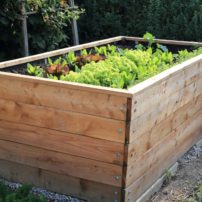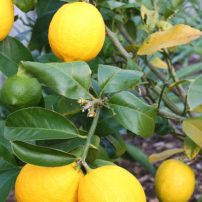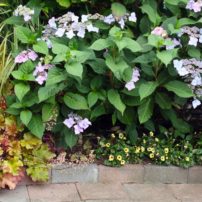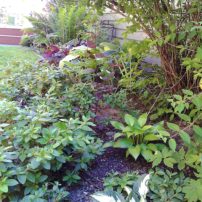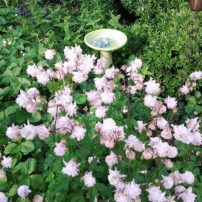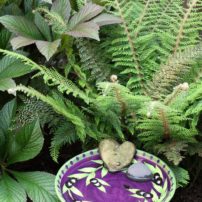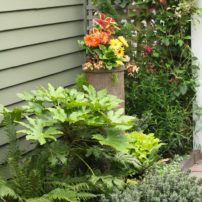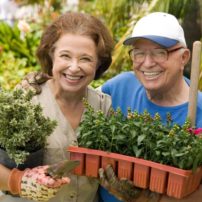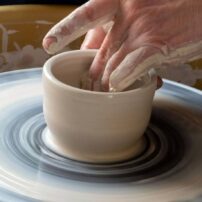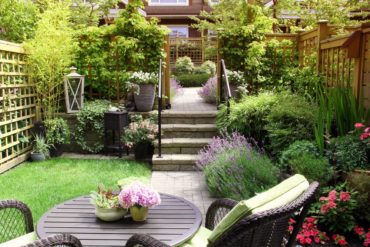 You’re a baby boomer. Your green thumb, and your knees and back, seem to bend with more effort. (Was 1968 really 50 years ago?)
You’re a baby boomer. Your green thumb, and your knees and back, seem to bend with more effort. (Was 1968 really 50 years ago?)
Don’t let your interest in gardening wane — gardening is important to physical and mental wellbeing as you get older.
One, gardening can help you stay fit.
“You use up calories when you garden,” says Ciscoe Morris, renowned throughout the region as a gardening show host and writer. “Working in the garden is exercise, it’s mentally stimulating, and it’s fun.”
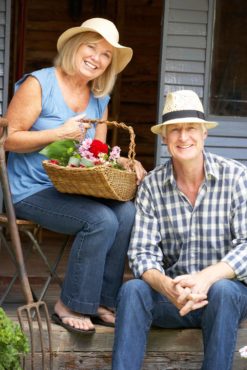 Two, gardening can help keep you young at heart. Noted horticulturalist Dan Hinckley has traveled to remote places around the globe in search of plants to collect and propagate. After an illustrious career that includes founding Heronswood in Kingston and Windcliff in Indianola, he still has a childlike awe of the miracle of seed-to-bloom.
Two, gardening can help keep you young at heart. Noted horticulturalist Dan Hinckley has traveled to remote places around the globe in search of plants to collect and propagate. After an illustrious career that includes founding Heronswood in Kingston and Windcliff in Indianola, he still has a childlike awe of the miracle of seed-to-bloom.
“I still feel the same about plants as I did as a kid,” he says.
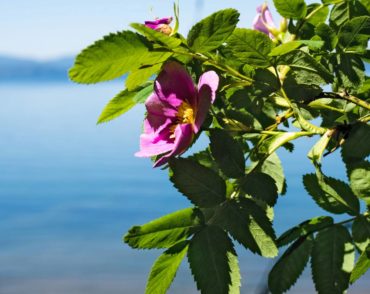
Three, gardening can boost your self-confidence. “There’s a sense of accomplishment that comes from feeding yourself and others from your garden,” Morris says.
Four, gardening is good for the soul. Gardening writer and author Debbie Teashon likes to take her morning coffee outside, where she can take in the scents of her garden, watch the butterflies and listen to the bees buzzing and birds singing. Many people tour other gardens for such an experience. “Here, you have it for free in your own garden,” she says.
Here are some tips on how to get the most from gardening — and how to make it easier as you age or downsize.
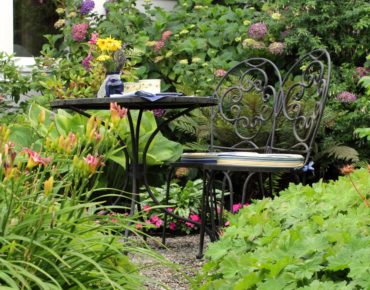
Plant Native and Waterwise Plants
Native plants are suited for the local climate and soil conditions and require less water and care.
Nootka roses grow well in the West Sound and provide habitat for birds and bees; the blooms scent the warm spring and summer air, and the rose hips make a tasty tea rich in vitamin C. Huckleberries and strawberries are easy to grow and are great for jam. Camas, columbine, honeysuckle and sword ferns also thrive in this area.
Other waterwise plants recommended by the city of Bremerton Public Works Department include evergreen huckleberry, mock orange, lance-leaved stonecrop, sea thrift and yarrow.
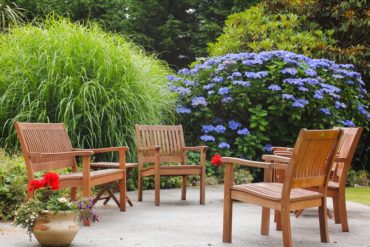
Master Gardener Linda Wells’ landscape, which gets sun and shade, features perennials, evergreens, ferns and groundcovers. Ferns are low maintenance, and groundcovers suppress weed growth. Her favorite groundcovers include Leptinella, or brass button, as well as dwarf mondo grass, rupturewort and saxifraga.
Go Natural
Use compost, mulch and fish fertilizer. Avoid chemical herbicides and pesticides and make your garden a safe haven for creatures great and small: birds, bees, insects and wildlife, as well as children and pets. Mulch prevents weed growth (making your job easier) and lessens the need to water.
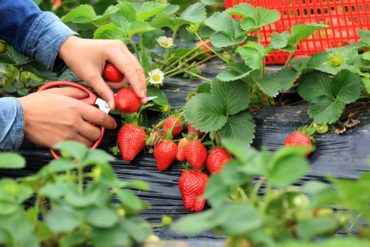
Use Containers, Raised Beds and Pots
You can garden — and supplement your table with healthy foods — even if you downsize to an apartment. Morris grows a gourmet blend of salad greens in a container.
“You can make a whole garden in a container,” he says. “Containers don’t take hardly any weeding at all and you can grow practically everything — Brussels sprouts, tomatoes, peas.”
Like containers, pots are also excellent for growing edible plants.
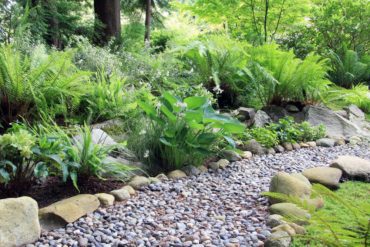
Morris tells of a dwarf cherry tree that can produce 20 pounds per season. Many plant growers offer fruit-bearing dwarf trees. Among them are Genoa and Meyer lemons; Bearss, Kieffer and Mexican limes; and avocado, blueberry, cane berry, grape, olive, persimmon and pomegranate.
Use More Hoses per Bib
Hinckley downsized — if you can call it that — from 15-acre Heronswood to 6-acre Windcliff (he is currently the garden director at Heronswood, which is now owned by the Port Gamble S’Klallam Tribe). He says that watering needs change as gardens mature, and recommends using hose bib adapters rather than fixed irrigation systems. Hose bib adapters enable you to attach multiple hoses to one bib.
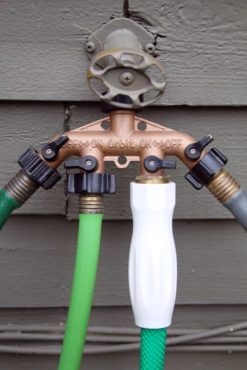
Joyce Schlote of the Master Gardeners Foundation of Kitsap County said her husband raised her hose bibs so they are at waist level.
“My faucets have adapters so I can run four hoses off one faucet,” she says. “And my hoses are arranged so that I don’t have to drag them around.” Hoses can be run along fence lines and edgings to keep them out of the way.
Place Slip-on Shoes at Every Door
Keep comfy shoes that are easy to slip on and off at each door. This makes it easier to go in and out to tend to garden tasks without having to stop and tie or untie shoes. Also, dirt isn’t tracked in when shoes are removed at the door.
Many gardeners turn to an older pair of shoes for gardening; Wells adds arch supports to her shoes for additional comfort.
Work Smarter
Schlote uses a padded kneeling stool. She can sit on it while she gardens or turn it over and kneel on it, then use the legs to help her get up. “It’s handy and keeps me from putting stress on my joints,” she says.
Wells stores tools at different places in her garden to minimize the need for trips back and forth. “My property is sloped, so I have a set of tools on the uphill side and on the downhill side,” she says. Ditto for containers for clippings and weeds.
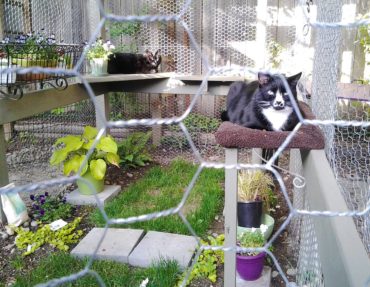
Tools should be cleaned after each use. If you’ve pruned a plant that has a fungus, you’ll want to clean your pruners before using them again so you don’t pass the fungus on to another plant.
(Another tip from Wells: Carry spray-on sunscreen with you to the garden; you can apply it as needed without taking your gardening gloves off.)
Be Flexible
Don’t be afraid to experiment. “Sometimes I’ll try a plant that’s interesting but decide it’s not right for that spot. So I’ll replant it or find a home for it,” Wells says.
Ease up on the dandelion. Sure, deadhead them. But learn to appreciate how those strong, rattail-like roots extend down several feet, breaking up hard soil. And take advantage of the plant’s uses.
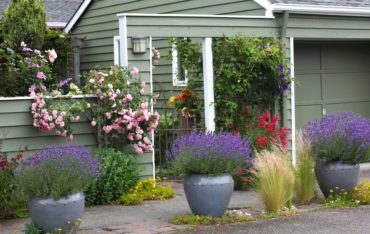
According to the Jamestown S’Klallam Tribe, dandelion — edible from blossom to root — is high in calcium; iron; magnesium; potassium; and vitamins A, B and C (try the leaves in sandwiches or salads). Also edible: purslane, plantain and mallow. Having a fine garden and yard doesn’t mean it has to be “golf-course perfect,” Schlote notes.
Have Fun
“Grow what makes your heart sing,” Schlote says. “Do as much as your body allows.”
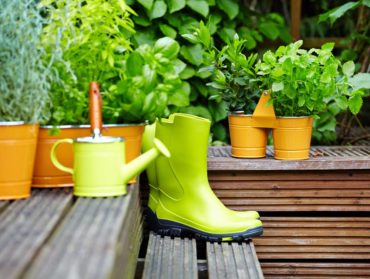 Schlote, a Master Gardener since 2012, has been gardening since she was 3. Her earliest memories are of gardening at a community garden with her father when she was a child. “I’m sure it’s one of the things that draws me to gardening now,” she says.
Schlote, a Master Gardener since 2012, has been gardening since she was 3. Her earliest memories are of gardening at a community garden with her father when she was a child. “I’m sure it’s one of the things that draws me to gardening now,” she says.
Like Hinckley, she has a childlike awe of watching stuff grow.
“If you give up on gardening, you give up on watching life and the wonder of growth,” she says.
Richard Walker is a journalist, author and poet who lives in Poulsbo.



